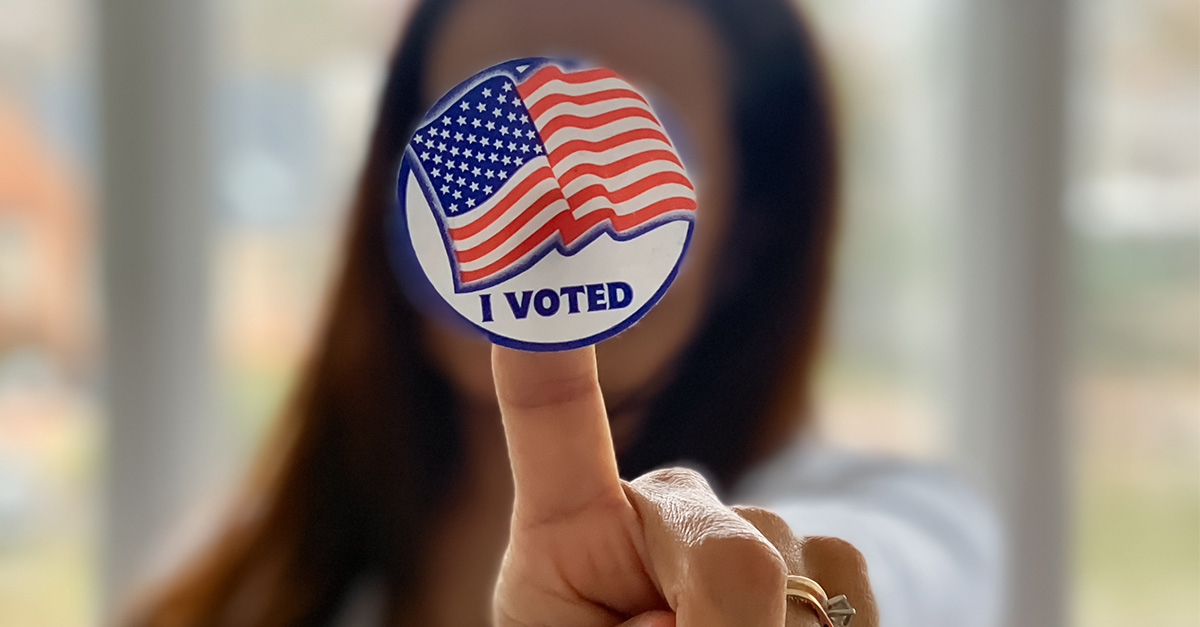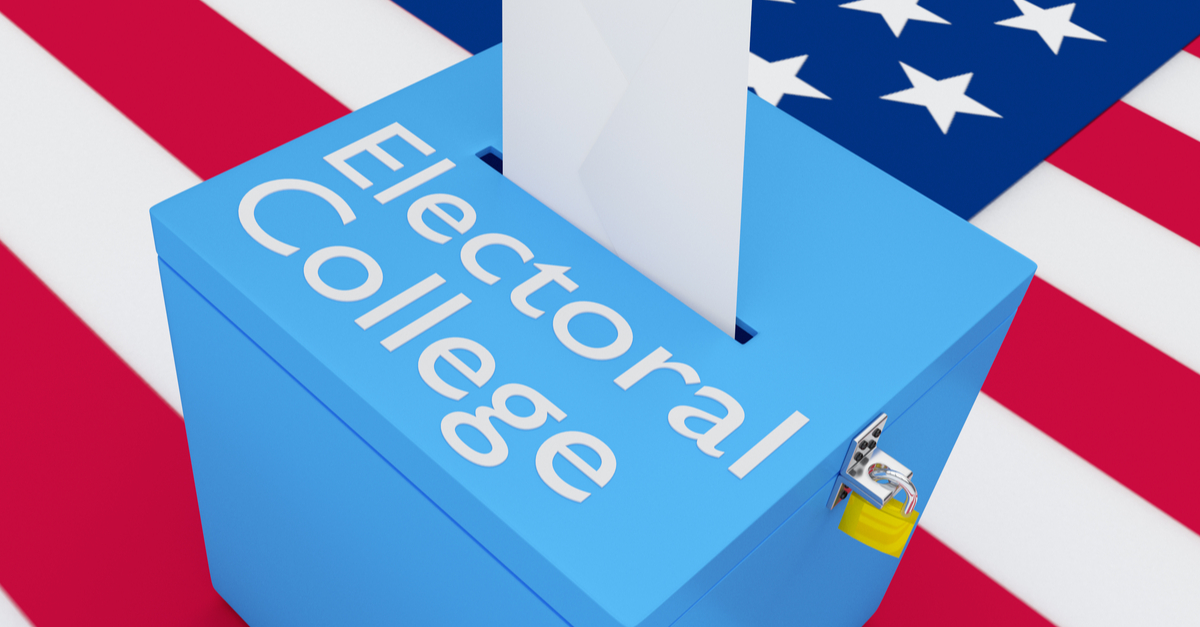


Get a free copy of Parental Rights & Education when you subscribe to our newsletter!

In 2017, the election for the delegate representing the 94th House District in Virginia ended in a tie because a single voter chose not to cast their ballot — impacting the power of the legislature and the direction of the state for the next two years.
“My vote won’t make any difference, so what’s the point in voting?” That’s a justification that far too many Americans use to stay home on Election Day.
In November 2017, a Virginia House of Delegates race could have been decided by a single voter, but because one voter chose not to cast a ballot, the winner ended up being picked by chance out of a clay pot by Virginia’s Electoral Board chairman.
That shocking result didn’t just affect one legislative race — it changed the immediate future of the entire state.
Here’s the backstory: Virginia is one of just a few states that conducts statewide elections during off-year elections. That means that one year after an election for the U.S. president, Virginia has a statewide vote for governor, lieutenant governor, and the House of Delegates (the entire legislature, including the state senate, goes through another election two years later).
Virginia’s election often serves as a barometer of the popularity of the new U.S. president and his policies. Such evaluations are seldom positive and generally difficult to assess after less than a year in office. That was especially true for Virginia Democrats in 2017, who were highly motivated to vote after the unexpected election of Republican President Donald Trump.
Since 2014, Virginia had a bipartisan government: a Democrat governor and a Republican legislature. Republicans had a razor-thin majority in the Senate, holding 21 of 40 seats, while in the Virginia House of Delegates, they had a comfortable majority, with 66 of 100 seats held by Republicans.
In November 2017, only the House of Delegates were up for re-election, and Democrats had grand hopes of taking control. To do so, however, they would have to flip 17 seats, a number the vast majority of pundits believed would be too large to overcome — despite the extreme unpopularity of President Trump in the bluest parts of the state. The consensus was that maybe 8 or 9 districts were in play for the Democrats, but definitely not 17.
On November 7, 2017, Democrats captured all the top-tier executive jobs, with Ralph Northam being chosen as the new governor. And as the votes came in for the House of Delegates, the minority party was surging, flipping seat after seat blue.
Except for one. The House of Delegate’s 94th District race between incumbent David Yancey and challenger Shelley Simonds was way too close to call.
The stakes were huge. If Republicans maintained Yancey’s seat, Republicans would control the house. If the Democrat was victorious, a new Speaker of the Virginia House of Delegates would need to be elected due to a 50/50 split, and bipartisan sharing of committee leadership would then be in order.
A recount was called.
On December 19, the district, located in Newport News along Virginia’s coast, again counted the votes. At the beginning of the tally, Delegate Yancey led by the slimmest amount — just 10 votes.
After a complete recount, an 11-vote shift in the tally declared that Simonds had defeated the incumbent by a single vote — 1 vote out of more than 23,000 votes cast. The final tally was 11,608 to 11,607.
Nearly six weeks of uncertainty was over, and the reality that the rival parties would have to share legislative power began to set in.
The upcoming General Assembly session would be contentious and agreements would be few and far between. Observers and legislators alike knew that the deadlock would hinder the passage of meaningful legislation introduced by either side. Sharing of leadership had not been seen in Virginia in nearly 20 years, and everyone knew it would be anything but harmonious.
Republicans and Democrats also knew that a single vote out of the nearly 2.5 million total votes cast across the state had put them in this position — a fact made even more bittersweet by the realization that just 47.6 percent of the electorate had chosen to vote that year.
After the outcome was announced, the change process was put into motion quickly. House Speaker Kirk Cox congratulated Shelley Simonds and thanked David Yancey for his service to the state of Virginia. Soon thereafter, his speakership title was removed.
But there was one snag: A three-judge panel needed to certify the results and decided to conduct their own review. That’s because one ballot deemed uncountable by a Democrat observer during the election had been challenged by the Republicans. The ballot in question had the anonymous voter selecting a Republican in each of the other contested races. In the delegate category, the voter had marked the oval next to Simonds name, crossed through it, and then filled in the oval next to Yancey’s name.
On the afternoon of December 20, Democrat elation and Republican despair came to a grinding halt.
The judges concluded that the ballot had properly revealed a vote for Yancey.
And with that, the race was now even, with each candidate having 11,608 votes each.
How would this stalemate end so that the legislative process could start on time in January 2018? Would the House members determine the winner? Would there need to be another election? Uncertainty reigned for those who did not know Virginia’s constitutional answers for such a circumstance.
But there was an easy answer. The possibility of a tied vote had already been anticipated by Virginia’s code and the legislative process established by the Virginia Constitution.
The name of the winner would be drawn by lot from a clay pot. Virginia election officials typed the names of Shelley A. Simonds and David E. Yancey on a piece of paper, inserted each name into a small plastic 35mm film canister, and placed them in a decorative bowl on loan from the Virginia Museum of Art.
On January 4, 2018, two months after voters had lined up to cast their ballots, James Alcorn, chairman of the Virginia Board of Elections, reached into the blue bowl containing the canisters. Drawing one out, he opened the gray cylinder and revealed the name of the winner, David E. Yancey. He withdrew the other film container to prove that Shelley A. Simonds’ name was also included in the bowl.
“This has never been done before for the longest-running, oldest legislative body in the New World,” Board of Elections member Clara Belle Wheeler said after witnessing what she characterized as an “unprecedented event” in the history of the Commonwealth of Virginia.
In Virginia’s long electoral history, there had occasionally been ties and winners drawn by lot, but never one in which the stakes were so high.
After considering all of her legal options, Shelley Simonds finally conceded to David Yancey six days later.
According to reporting by NBC News, “The race attracted limited attention before Election Day, but an overtime battle that took more turns than the James River made national headlines.”

There are no bona fide excuses for Americans not to vote. It is a relatively simple process that only requires a few easy steps and a willingness to participate, and the options for how and when to cast a ballot are more plentiful than ever before. You can be absent from your state, or even at home but bedridden, and still vote by mail. In all but three states, you can vote early. You can go to your local election office and cast your vote, or you can request a ballot and leave it in a dropbox in a convenient location. And, of course, you can vote in person on Election Day.
All Americans should vote, but this is even more true for Christians, who are commanded to carefully and prayerfully steward all that God has gifted us. This includes your right to vote.
In Matthew 5:13-14, Jesus calls His followers to be “the salt of the earth” and “the light of the world.” The “earth” and the “world” include the government. And if the government is on His shoulder, as Isaiah 9:6 said prophetically of Jesus the Messiah, then we are to be His ambassadors in this current culture and do our part to determine the direction of government — just as we are to be a voice of reason and righteousness in our church, our family, and our community.
Just 7 years ago, control of the House of Delegates in Virginia was determined by 1 vote out of nearly 2.5 million voters. One vote made all the difference.
And that vote helped hold back the tide of radical progressive policies for two years.
It would not last. In 2019, a blue wave swept over Virginia, as Democrats took control of both houses of the legislature. Virginians were now under a one-party government. As a result, a number of destructive progressive policies were soon passed.
For starters, there would be no legislative check on the austere COVID lockdown policies that were put in place by Gov. Northam less than six months later.
And among other actions, the new legislature removed the requirement for a photo ID for voting; instituted new gun control laws; decriminalized marijuana possession and removed mandatory punishments for serial drunk drivers; replaced the terms “husband” and “wife” in the state legal code with gender-neutral terms; and passed a conversion therapy ban for minors, making it impossible for parents of gender-confused children to send them to a counselor and expect any result other than affirmation of their confusion.
Was this what the majority of Virginians wanted? It’s hard to know since only 42.4 percent of registered voters showed up to cast their ballot that year.
Today is another Election Day. Our fellow Americans and especially our fellow Christians: Go vote. Your voice matters. It counts. Make it heard. And always remember: It’s never out of the realm of possibility that yours could be the single vote that changes the direction of a state — or a nation.
If you like this article and other content that helps you apply a biblical worldview to today’s politics and culture, consider making a donation here.

Notifications